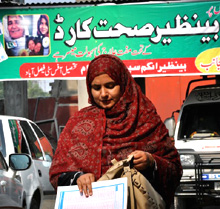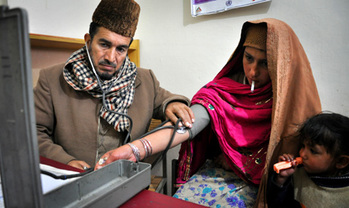Health sector support
Programme description
Title: Health sector support
Commissioned by: German Federal Ministry for Economic Cooperation and Development (BMZ)
Country: Pakistan
Lead executing agency: Economic Affairs Division; Ministry of National Health Services, Regulations and Coordination; provincial health departments of Khyber Pakhtunkwha and Punjab
Overall term: 2010 to 2015

Context
Pakistan's health indicators are considerably worse than those of other countries in the region with a comparable level of development. This is particularly true of maternal and child mortality: one in 11 children in Pakistan die before their fifth birthday, while the figure is 1 in 19 in Bangladesh and Nepal. Noncommunicable diseases such as diabetes and cardiac disease, injuries and mental illnesses are steadily increasing. They account for around half of the country's burden of disease, the other half being attributable to contagious diseases such as tuberculosis. The institutions in Pakistan's health system lack the necessary professional capacities and are unable to offer the population comprehensive, affordable health care of adequate quality.
Objective
Affordable health services of adequate quality are increasingly available to the population in selected regions in Pakistan.

Approach
The provincial health departments are advised on how to organise Pakistan's health system more effectively and economically to meet patients' needs. The health programme advises and strengthens the Government of Pakistan at federal and provincial level in managing the health sector. The programme assists the departments in drafting laws and supports them in human resource development and health financing. Other topics include quality management, monitoring and information management. These general topics are linked to current health care problems, such as safe blood transfusion services and the fight against tuberculosis.
GIZ is providing support in four areas of activity, in some cases throughout the country and in others in selected provinces:
- Health care
- Blood bank safety
- Health financing
- Good governance in the health sector.
The measures are geared not only towards the supply side, namely health service providers, but also the demand side of the health care system, the citizens and in particular the poor.
Results
By the end of 2014, 75,000 families had been admitted to the social health fund introduced in Punjab province in 2011. Forty per cent of these people use the fund for health services connected with pregnancy and birth. Comprehensive and compulsory quality standards have been introduced for clinical practice and the management of health care facilities providing basic medical care.
The National Blood Transfusion Service (NBTS) has drawn up and adopted a strategic framework plan on safe blood transfusion services containing guidelines for legal reform in the provinces.
In 2011, the cure rate for tuberculosis was more than doubled in Khyber Pakhtunkwha and is now over 90 per cent. The Centre for Population, Health and Social Policy, set up with support from GIZ at the Pakistan Institute of Development Economics, is helping to train professionals in the health economics sector. The computer-based human resources information system introduced in 2010 is being used successfully at five different locations. German development cooperation has promoted the development of a postgraduate certificate on human resource management in the health sector. A total of 52 participants have graduated from the course so far.

With support from GIZ, the Government of Pakistan has amended important laws regulating private institutions and giving state-run hospitals more autonomy. Plans have been made to facilitate the establishment of private institutions using the Health Foundation. The law on hospital autonomy will allow state-run institutions to retain the revenue obtained from treating people with health insurance in the hospital budget and spend it on measures to improve quality. This will enable the social health insurance schemes to apply leverage to improve the quality of medical care.